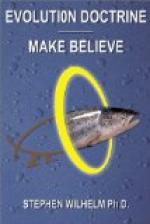The complex lives of communal insects like ants and bees bring us to the level of mentality where an understanding of causes and effects seems to be the guide for conduct. Nevertheless the facts do not warrant the assumption that reason and intelligence play any part in the mental life of these creatures, as they do in the lives of man and the apes. Because we ourselves can see the utility of the definite and peculiar behavior of the queen and the worker, there is no logical necessity for assuming an identical form of knowledge as a possession of these insects. Many investigators have dealt with these fascinating subjects, and they are almost unanimous in the conclusion that the instinct of an insect is a mechanical and hereditary synthesis of combined reflex acts.
The lower orders of psychological processes play a far larger part in the lives of the higher animals than we are wont to believe. A pointer and sheep dog possess different qualifications in the way of instincts that make them useful to man in different ways. A bulldog or a game-cock does not reason out its course of action during a contest, but like a mechanism when the spring is released, it acts promptly and with effect. A ball flashing past the human eye causes the lids to close unconsciously, and it is not always possible to inhibit this instinctive mechanical act by the exercise of the will. An examination of the workings of the human body reveals manifold activities of an even lower or reflex nature, like the movements of the viscera and the adjustments in respect to the amount of supplies of blood sent to different parts of the body as local needs arise. Directed always by specific portions of the nervous system, such reflex actions play their part in human life without any effort on the part of reason and so-called will, and without coming into consciousness except indirectly and subsequently.
Passing by many interesting members of the psychological series of intergrading forms, we reach the familiar animals like the cat and dog and horse which display what is called intelligence. This is the power to learn by experience, and to improve the quality and promptitude of reactions to stimuli. In certain respects intelligence seems to differ from instinct, inasmuch as it involves a response to stimuli that may be altered and quickened by repeated experience, but in ultimate analysis the two forms of psychological processes are fundamentally alike. A single example chosen from Thorndike’s extensive investigation will serve to bring out the primary characteristics of intelligence. A cat was placed in a latticed cage provided with a door that could be opened from within when a catch was pressed down, and meat was put in a dish outside the door where the cat could see it. At first, the animal escaped from the cage by freeing the door during its aimless scrambling about the catch, but as trial after trial was made, the time necessary for the cat to make its way out




